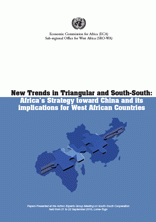New Trends in Triangular and South-South: Africa’s Strategy toward China and its implications for West African Countries

Relations between China and Africa which were essentially ideological in nature during the cold war period have undergone a rapid expansion in the recent past as a result of the strong growth and economic boom which have given fresh momentum to China’s arrival on the international scene. The stakes involved in China-Africa cooperation have provided a platform for debate which will be analysed in this publication with a view to enabling African countries in general, and West African countries in particular, to identify the strengths and weaknesses in this relationship as well as the opportunities and risks involved.
During the cold war, the isolation of Taiwan and alignment with Communist and Socialist- type policies constituted the principal orientations of Chinese foreign policy. Consequently, China-Africa cooperation was mainly political in character, backed by military and financial assistance, and accompanied by limited trade relations. This form of cooperation was relatively successful in the post-cold war period, targeting countries with rich reserves of strategic materials and other minerals, and including the involvement of China in the infrastructural and agricultural development of the target countries.